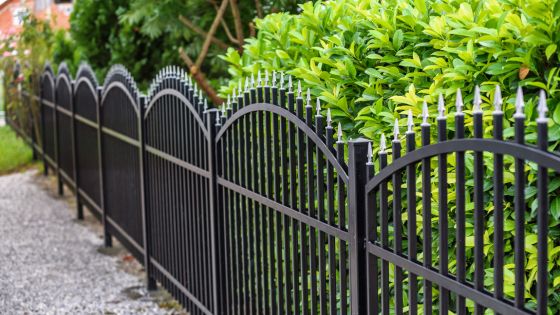DIY vs. Professional Fence Repairs
A well-maintained fence adds visual appeal and practicality to your property. Weathering, age, and accidents may require fence maintenance over time. In such instances, it may be tempting to DIY, but calling a professional fence contractor like The Fence Company Arizona may be the best option. We’ll discuss DIY repairs and when to call the pros here.
When to DIY Fence Repair
Fence repairs may not require a professional. Examples of DIY repairs:
1. Unsecured Boards
Wooden fences frequently lose boards. This is a DIY fix for a few boards. Restore your fence with basic tools and replacement boards.
2. Sagging gates
Due to weathering and use, fence gates may sag. With the necessary equipment, you can fix this by adjusting or replacing the gate hardware.
3. Minor Rust
Fix minor rust spots on a metal fence yourself. Wire brush the rust, then apply a rust converter and new paint.
Arizona Fence Company: When to Call
Due to the complexity and tools needed, certain fence repairs require a specialist. When to hire a fence contractor:
1. Structural damage
Call the pros if a storm or collision has damaged your fence’s structure. They can safely repair or replace fence parts.
2. Complex Setups
Some fence repairs appear simple but are complicated. Replacing a vinyl panel, mending an electric gate, or installing a new chain link fence section may require professional precision and understanding.
3. Pest/Rot Damage
Call a pro if your wooden fence has serious rot or bug damage. They can analyze the damage, identify its degree, and recommend the best treatment, which may involve treating the wood or replacing damaged areas.
Masonry fences
Masonry fence repairs are rarely DIY. Maintaining a durable and attractive fence demands specialized expertise and tools. Professionals can match stones or bricks and blend the repair with the fence.
For small repairs, DIY is cost-effective, but hiring a professional fence contractor like The Fence Company Arizona ensures that your fence is repaired correctly and lasts. Consider these before repairing your fence yourself:
1. Time and money
DIY repairs: do you have time? If a poor remedy recurs, will it cost more in the long run?
2. Techniques
Are you qualified? If not, hiring a professional from the start may be cheaper.
3. Safety
A competent fence repair job ensures safety and longevity.
DIY fence repair vs. hiring a pro is simple. DIY can work for basic repairs if you have the expertise, time, and materials. For more serious or complex concerns, hiring a professional fence contractor like The Fence Company Arizona will save you time and aggravation while assuring you a quality repair that lasts.
The Fence Company Arizona Offers Eco-Friendly Fencing
In an age where environmental concern is more than a trend, every action we make can help green the earth. This includes fencing. The Fence Company Arizona can build an eco-friendly, gorgeous fence. We review eco-friendly fencing solutions to help you choose green.
1. Bamboo Fence
Bamboo, a sustainable fencing material, grows quickly. Bamboo fences are low-maintenance, attractive, and pest-resistant. This tropical touch can improve your property’s aesthetics while reducing your environmental impact.
2. Recycled composite fencing
Eco-friendly composite fencing is created from recycled polymers and wood fibers. These fences look like wood but are more durable and low-maintenance. They are durable, green, and insect-resistant.
3. Living Fences
Living fences of shrubs, trees, or flowers are the most eco-friendly. These fences establish your property boundaries and increase air quality, biodiversity, and wildlife habitat. Their aesthetic and environmental benefits outweigh their maintenance.
4. Reclaimed Wood Fence
Wood is a popular fencing material, although non-sustainable woods can harm the ecosystem. For a traditional fence without deforestation, use reused or recovered wood. Each salvaged wood fence adds character to your property.
5. Metal Fences
Aluminum and steel fences are robust and recyclable. Aluminum or steel fences survive decades and can be recycled when replaced. Metal fences are greener than non-recyclable ones due to their durability and recyclability.
Consider these while choosing an eco-friendly fence:
1. Material Lifecycle
The material’s lifecycle: sustainable? Does it use recycled or rapidly renewable materials or trees from non-sustainable forests? Fencing material lifecycle study can reveal its environmental impact.
2. Reliability
How long does the fence last? Long-lasting, low-maintenance fences reduce environmental effects. Living fences are green, but they may require more resources to maintain than bamboo or composite fences.
3. Death
How does the fence die? Is it recyclable or landfill-bound? Recyclable fences like metal or composite have a smaller environmental impact.
The Fence Company Arizona can help you choose an eco-friendly fence. Their knowledge and experience can help you choose the best green fencing for your property.
Bamboo to living fences, salvaged wood to recycled composites—eco-friendly fencing is diverse and inventive. These solutions let you choose sustainably without sacrificing style or function. Consider eco-friendly fencing options for your next project. You’ll improve your property’s aesthetics, security, and environment. It’s a win-win.













